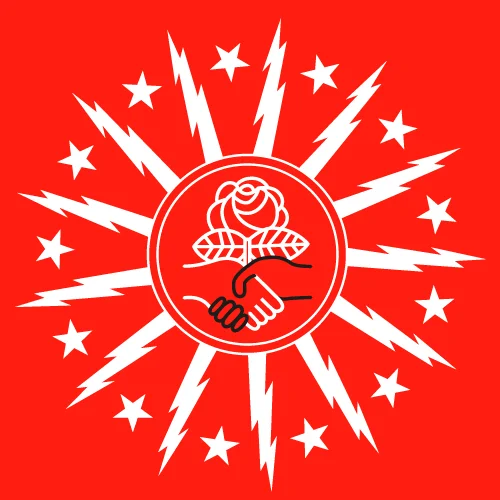

Dennis Serrette: Presenté


Buffalo DSA Statement Condemning Arrests at UB and Affirming Protestors’ Rights and Demands
At University at Buffalo’s North Campus last evening, police initiated an unprovoked attack on peaceful Palestinian solidarity protestors. In a clear violation of student’s first amendment rights nearly two dozen protestors were violently arrested without justification.
The Buffalo chapter of the Democratic Socialists of America condemns these arrests and the erosion of Buffalonians’ civil liberties they represent.
This unnecessary escalation was an obvious attempt to stifle free speech, nothing more.
We call for an end to the siege of Gaza and an end to the occupation by the IDF. We demand our educational institutions disclose their ties to the apartheid state of Israel and defense contractors and, where such relationships exist, immediately divest and disassociate.
End the occupation. Stop the genocide. Boycott, divest, and sanction Israel. Drop the charges against protestors. Uphold our First Amendment rights.


May Day Statement
In Houston, we know that we are not alone in our struggle for economic, social, and housing justice. We are not alone in the struggle for liberation from capitalism, colonialism, […]
The post May Day Statement appeared first on Houston DSA.


Student Encampment Solidarity Statement
(This statement is from April, 24, 2024) We stand with unwavering solidarity with the students in Rice University, the University of Houston, Columbia University, and all campuses, as they demand […]
The post Student Encampment Solidarity Statement appeared first on Houston DSA.


Houston voters overwhelmingly pass Proposition A!
(This post is from November 8, 2023) For the last 11 weeks, our members have been on the ground talking to Houstonians all over the city about the importance of […]
The post Houston voters overwhelmingly pass Proposition A! appeared first on Houston DSA.


Disclose & Divest: The Student Movement Against Genocide
Students here in New York and across the country are staging protests and encampments on university campuses in solidarity with Palestinians under siege in Gaza for over 200 days. The student movements are united by a common call for their institutions to divest and boycott the state of Israel, companies, and institutions complicit in Israel’s occupation and ongoing genocide in Gaza. In response to this vast mobilization of students, the university administrations at Columbia, NYU, CUNY and elsewhere have handed out mass suspensions & even threats of expulsion to students involved in the encampments, in addition to unleashing NYPD to arrest students protesting peacefully on their campuses. Tonight, we will hear from the students themselves. We will hear from Britt, a student organizer at the Gaza Solidarity Encampment at CUNY City College, about the ‘Five Demands’ of the students to the CUNY administration. We will also be joined in-studio by Erin, a student at NYU and a member of the National Coordinating Committee of YDSA, to hear the latest from the NYU encampment and what YDSA is doing to meet the national moment.
*This episode was recorded at 7pm Tuesday night before the NYPD sweep and mass arrests of students at Columbia and CUNY. Go out and provide jail support for the arrested students & comrades opposing genocide at One Police Plaza
Link to CUNY Gaza Solidarity Statement: https://twitter.com/cunygse/status/1785677626431934751/photo/1


Radical Theological Education | Tim Conder & Daniel Rhodes


DSA IC Affirms Iran’s Right to Self-Defense
The Democratic Socialists of America’s International Committee (DSA IC) affirms Iran’s right to self-defense in response to the illegal Israeli strike on the Iranian consulate in Damascus. DSA IC reiterates our firm opposition to providing any military or diplomatic assistance to the Zionist project, which is currently engaged in a genocidal campaign against the Palestinians and reckless attacks on neighboring states, posing a serious risk of escalating into a full-blown regional conflict. We oppose any U.S. participation in or support of Israeli strikes against Iran and denounce punitive measures such as sanctions and travel bans enacted by the Biden administration or Congress in response to Iran’s defensive strikes on Israel.
Despite western attempts to paint Iran as the aggressor, DSA IC recognizes that Iran has long been targeted by the U.S. and its allies for its efforts to establish national self-determination and champion Palestinian liberation. Since the CIA-orchestrated overthrow of Prime Minister Mohammad Mossadegh in 1953, the US and Israel have wrought war on the Iranian people by murdering millions in the Iran-Iraq war, carrying out regular assassinations of its leaders, scientists, and top-commanders on diplomatic missions, and depriving the Iranian people of necessary medical supplies through sanctions. This is part of the U.S.’s imperial policy: destruction and de-development against any country that exercises sovereignty or opposes U.S. hegemony.
The Israeli Occupation Force’s (IOF) April 1st strike against the Iranian Consulate in Damascus, which killed at least 16 people including a senior Islamic Revolutionary Guard Corps (IRGC) Commander, represents an extremely serious violation of international laws and norms governing diplomatic relations between states, including the 1961 Vienna Convention on Diplomatic Relations and 1963 Convention on Consular Relations. The Biden administration’s “iron-clad” support of the Zionist project has allowed Israel to operate with total impunity, resulting in gross violations of international humanitarian law and military provocations against regional allies of Palestinians which threaten to destabilize the whole of West Asia.
Not only has the Biden administration refused to deescalate the current crisis with a denunciation of the Israeli strikes on the Iranian consulate, but it also blocked the United Nations Security Council (UNSC) from doing so. Likewise, President Biden did not act on the purported Iranian offer to forgo a retaliatory strike on Israel in exchange for a permanent ceasefire in Gaza. On April 13th, Iran launched a limited defensive strike against Israel, hitting several Israeli bases including the Netavim Air Base from which the attack on the Damascus consulate was launched. The strike was telegraphed in advance, allowing for ample preparation by Israel and the U.S. The strike’s success highlights the ability of Iran to defend itself against Zionist aggression and restore crucial deterrence against increasingly rogue Israeli actions. Additionally, the Iranian defensive strikes have helped to further undermine the mantle of invincibility which the Zionist project has constructed in order to allow its continual ethnic cleansing and genocide in their colonial occupation of Palestine.
While it is reported that the Biden administration will not participate in Israeli strikes against Iran, continued statements of “iron-clad” support for Israel leave the door open for runaway escalation. With Israeli Occupation Forces crossing the Lebanese border in recent days, intensifying bombing of southern Lebanon, and their continued genocide in Gaza, Israel is dragging the U.S. into a larger death spiral. DSA IC reiterates our demands for an immediate ceasefire in Gaza, an end to all military aid to Israel and an end to sanctions against the people of Iran. The power to stop this genocide and end this rapidly escalating regional crisis remains in Biden’s hands. The Biden administration bears full responsibility for every death that follows. No war with Iran! Free Palestine!
The post DSA IC Affirms Iran’s Right to Self-Defense appeared first on DSA International Committee.


Fighting for benefits: One local union's successful battle for transit subsidies


Socialism in the Bronx with Jonathan Soto
In this episode we meet Jonathan Soto, the DSA endorsed candidate running for New York State Assembly in the North East Bronx. Jonathan is a public school parent, an inter-faith organizer and a democratic socialist, campaigning to unseat longtime incumbent Michael Benedetto in Assembly District 82.